Judy vs Judy: How the biopic matches up to the true story of Judy Garland
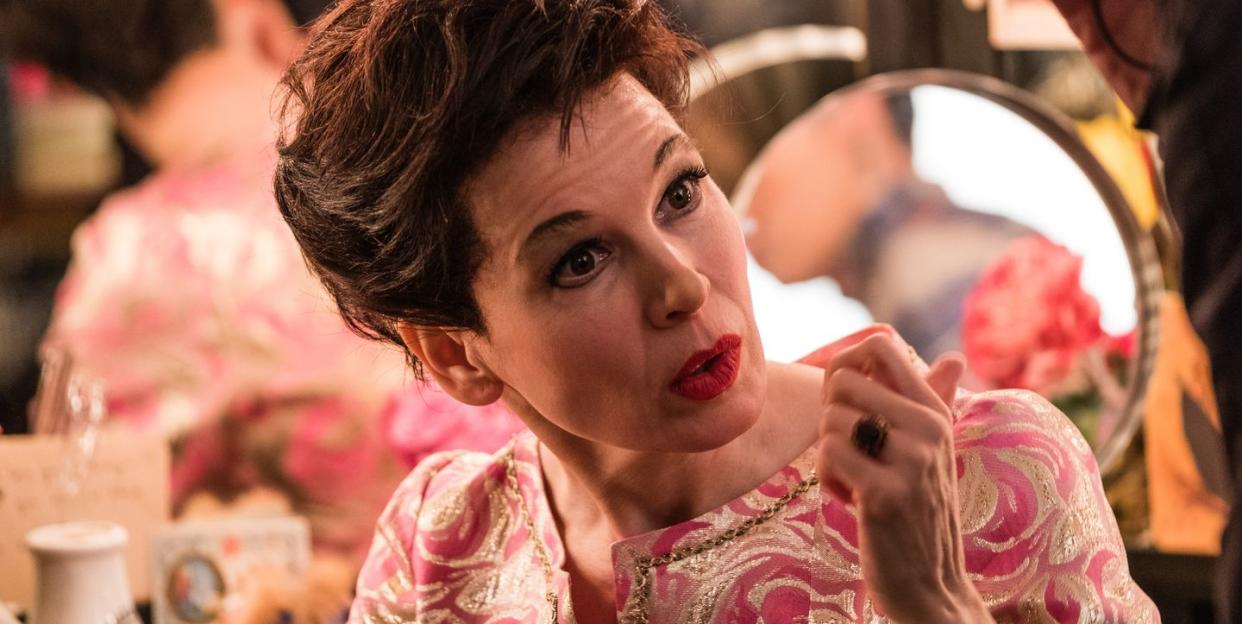
Renée Zellweger is already the subject of plenty of Oscar chatter for her role as Judy Garland in the upcoming biopic aptly titled Judy. The emotional backbone of the biopic rests almost on her performance.
For two hours and 40 minutes, Judy explores the final days of the megastar's waning career, interwoven with flashbacks to her childhood at the mercy of MGM Studios' Louis B Mayer, which laid the foundation for the troubles she faced in her adult life.
Despite the name of the genre, biopics don't always stick close to reality. They take liberties for the sake of drama and the practicalities of making an entertaining and moving film.
Though Judy Garland may be one of the most recognisable names in entertainment history, her real life is still shrouded in some obscurity, mythologised to the point of fiction.
Outside of America, the true story of her life isn't well known. Even inside America, fact and fiction muddle together in the grey area of Hollywood history.
So how many liberties did Judy take? And in the end, does it even matter?
That performance of 'Over the Rainbow'
Judy's final, arguably most triumphant moment, comes not during her scheduled Talk of the Town shows, but instead when she stage-crashes Lonnie Donegan.
By this point in the film, Judy's remaining shows for her Talk of the Town series have been cancelled, but she still goes to the theatre to watch her replacement, Donegan, perform. The roar of the crowd, however, is too much for her and she asks him if she can go on instead.
He acquiesces and she goes on to belt out 'I'm Gonna Love You' before sitting on the stage, lit only by a single shaft of light, to sing a tear-stained, voice-breaking rendition of 'Over the Rainbow'.

In reality, she completed her five-week Talk of the Town series. However, she did sing 'Over the Rainbow' in exactly the manner portrayed in the movie.
At the time, the Observer wrote: "She sits cross-legged, lit by a single spotlight, alone in a great emptiness. No more gimmicks, no more show. Just a small girl who has been put down but who refuses to give in. Her voice cracks a little, sighs a little. No more smiles, no more noise."
However, she also sang the song in the same manner at Carnegie Hall in New York years earlier, in 1961. The performance is often referred to as the greatest night in showbusiness history.
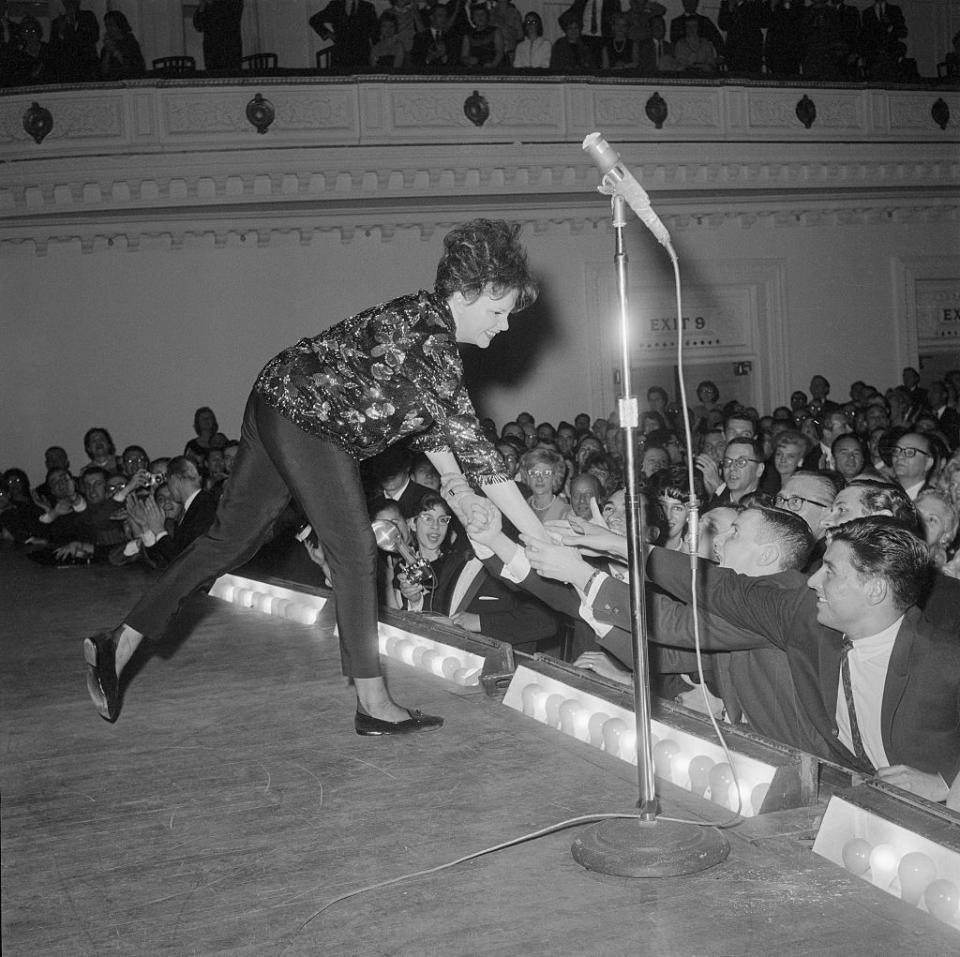
You can listen to a clip of her singing 'Over The Rainbow' at Carnegie Hall, and pausing to cry, here.
Sid vs Mickey
The movie doesn't portray her husbands as particularly brutal, a definite choice on the part of director Rupert Goold, who based the movie on Peter Quilter's play End of the Rainbow.
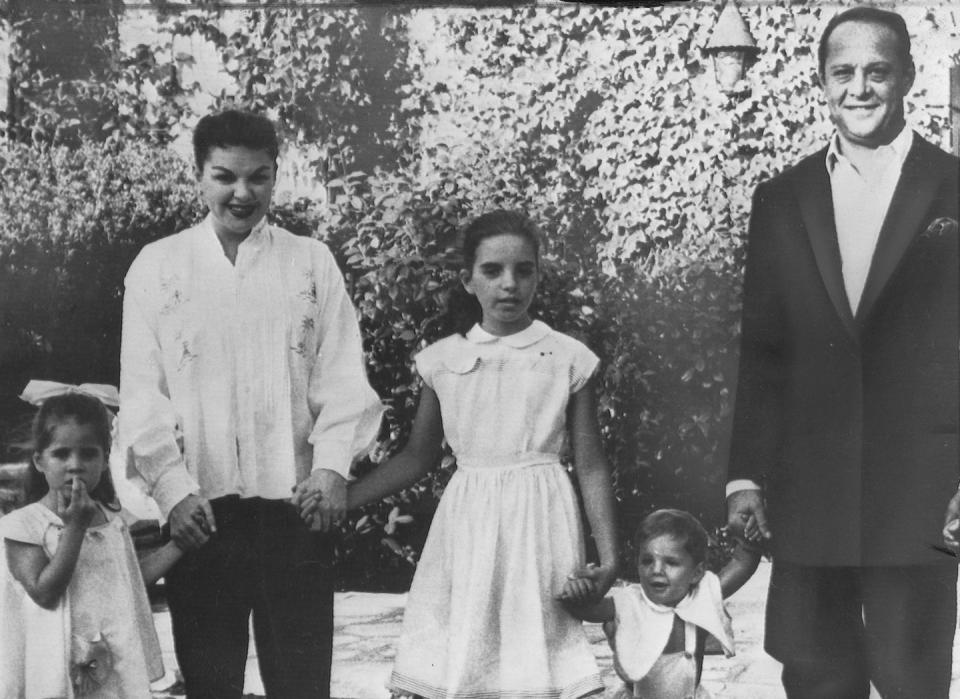
Garland claimed that Sid Luft, the father of her two children Lorna and Joey, beat her.
In 1965, during their divorce hearing, she told Judge Edward R Brand: "He struck me many times. He did a lot of drinking." (Via the New York Times.)
As for Mickey, the great hope and Garland's fifth husband, he was not as sympathetic as the movie made out. Though they did give him one violent moment, in which he throws a glass, he was much worse.

Rosalyn Wilder (played by Jessie Buckley in Judy) said of Deans: "[He was the] dreadful man who became her husband… I mean if she put an advert in a newspaper for the most unsuitable person to take care of her, she wouldn't have had a better response… I don't know what possessed… Well, I know what possessed her because he gave in to her and he fed her all the things she wanted."
Dinner theatre turns ugly
Of her less-than-stellar nights, the Observer wrote: "She wrestles with the microphone lead, wandering round the stage as if in search of a place to put it... She drinks and toasts herself. Her words become more and more slurred."

And it was on these nights that she really was pelted by food.
Wilder revealed: "A lot of people threw things most nights. She was late and erratic."
Dinner theatre goes swimmingly
In the movie, Judy manages to pull herself together enough to do some stellar performances, for which the audience is grateful. She dazzles with a voice powerful beyond her appearance.
In reality, however, "she did sometimes come in a little bit late and do a reasonably good show, and that was fine. But there were too many nights when she just didn't come in at all. Or she came in terribly late, by which time the good will of the audience had largely disappeared," said Wilder.

The ups portrayed in the movie, therefore, were slightly overblown in comparison to reality.
Frances Ethel Gumm
Judy Garland's life before Talk of the Town is only told in flashbacks to Judy's childhood, as a teen at the mercy of Louis B Mayer.
But most of what the movie details is true. In a particularly scathing scene, in which Judy pleads with Mayer for rest – that she's so tired she's forgotten her name – he lambasts her. "Your name is Frances Ethel Gumm, your father's a f***ot," he begins – and only gets meaner.

In reality, her father was likely homosexual. In Gerald Clark's book Get Happy: The Life of Judy Garland, he wrote that the family relocated after rumours surfaced that Frank was making advances towards the male ushers in the cinemas he ran.
Her mother was of no help. Garland described her as "the real Wicked Witch of the West".
Louis B Mayer, drugs and vaudeville
Not quite sex, drugs and rock n' roll, but pretty damn close. Of her childhood, if you could call it that, according to one biography Garland said: "They had us working days and nights on end. They'd give us pills to keep us on our feet long after we were exhausted. Then they'd take us to the studio hospital and knock us out with sleeping pills – Mickey (Rooney) sprawled out on one bed and me on another. Then after four hours they'd wake us up and give us the pep pills again so we could work 72 hours in a row. Half of the time we were hanging from the ceiling but it was a way of life for us."
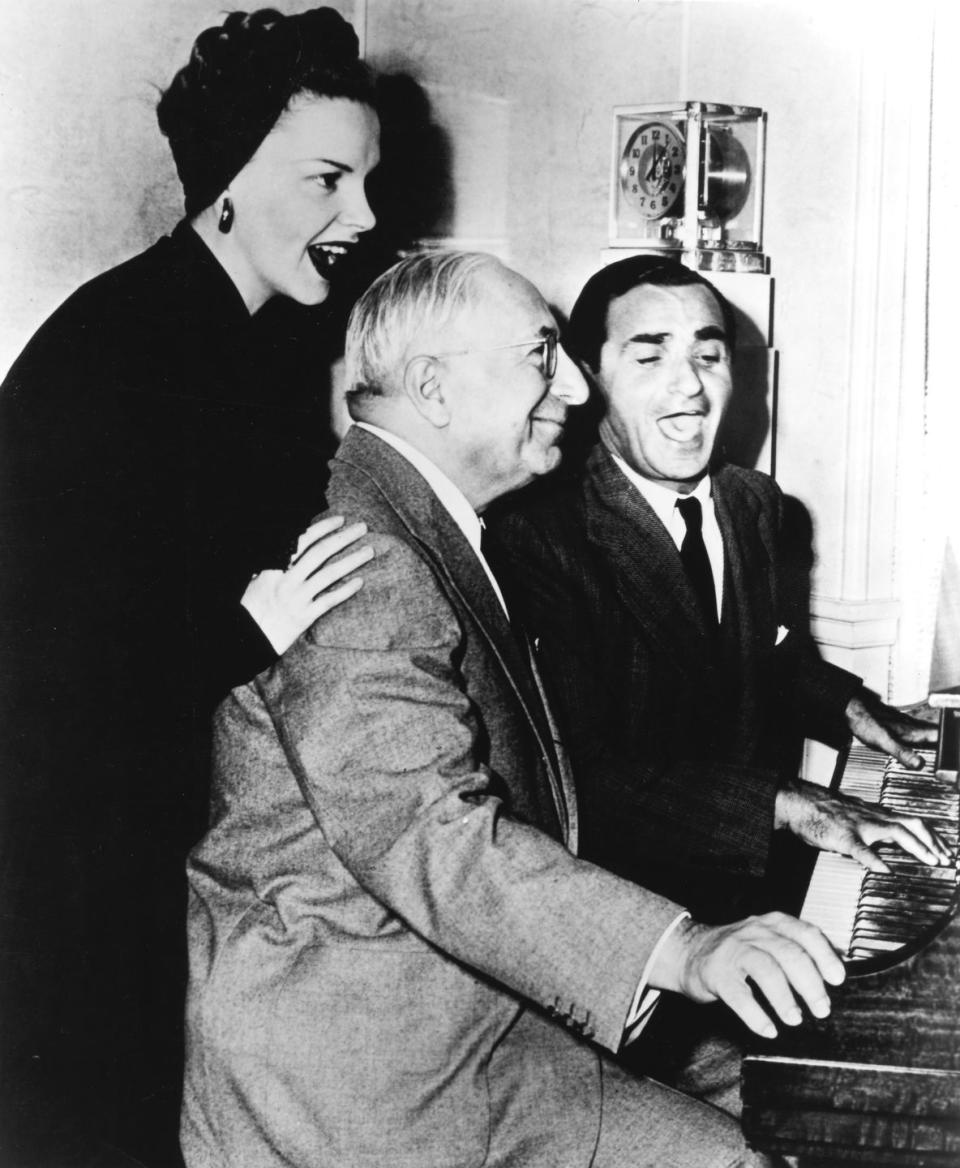
During the same, exceptionally creepy moment in the movie, Mayer softly taps her sternum while talking about her voice. This also happened, according to Garland herself.
She said of the moment: "I often thought I was lucky I didn't sing from another part of my anatomy."
Money problems
Though the financial burdens that dogged Judy in her later years are the very impetus that pushes her to take the Talk of the Town gig in London, they are only touched on briefly in the movie.
In the film, Judy claims Sid only married her for her money and then proceeded to gamble it all away. But in reality, the people responsible for most of her money woes were her agents post-Sid, Freddie Fields and David Begelman.
The pair had embezzled a good deal of her earnings, which resulted in her owing approximately $500,000 to the IRS. According to Rainbow's End: The Judy Garland Show, checks from her account were written to cash, and endorsed by Begelman at various Las Vegas casinos.

Likewise, Begelmen authorised payment for 'protection' which Garland never had. Garland was gifted a 1963 Cadillac convertible but the title was made out to Begelman and Garland reportedly never knew she'd been given the car at all.
He also claimed that someone was blackmailing her with a photo of her having her stomach pumped while partially naked in an emergency room in London. She paid a ransom rather than risk the bad publicity. It was discovered that, surprise surprise, the check ended up in Begelman's account.
Who are those gay superfans?
Judy Garland was a gay icon and the movie personifies her significance to the gay community in two characters, a couple who attend every night of her Talk of the Town performances.
Though in the movie she expresses a closeness with the couple who attend her show – even going back to their apartment for dinner and sharing in an intimate, vulnerable moment – in reality, she didn't view herself in that light.
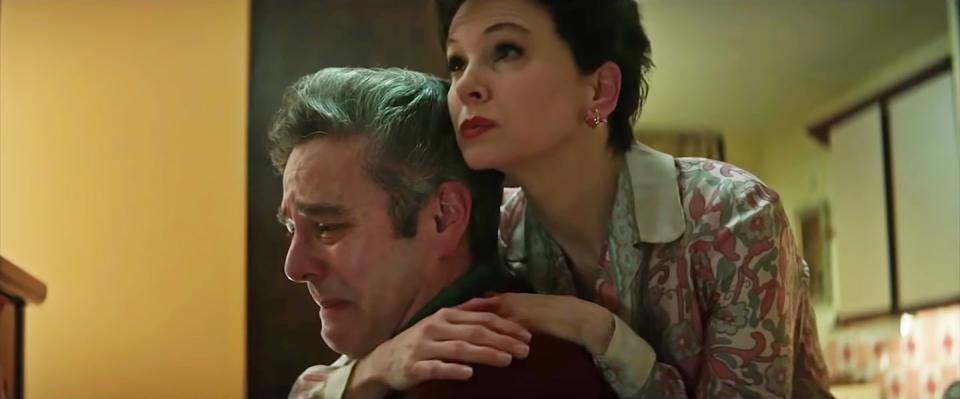
While not a champion of gay rights in particular, she did respond in a supportive way when asked about her gay following. She responded to the question with: "I couldn't care less. I sing to people!" (via Queerty.)
The show must go on
In the movie, her first night at Talk of the Town almost didn't happen. Right before heading on stage, she turned to Rosalyn Wilder and said: "I can't do it." After a brief negotiation, Judy went on stage and wowed the audience.
In reality, the moment was far more desperate and protracted.
A back-and-forth ensued over Garland's use of pills, according to Wilder herself.
She recalled: "I said, 'Look, I’m here and if you get nervous just walk off and I’m here'... If you feel nervous and you feel you can’t go on then just come off... Just walk off, I'll give you a couple of the pills and you can go back on again'. She didn't think she could do that so I said, 'Well, just let's wait here a couple of minutes because if you think about it, I think you probably can do it'."

In the end, she mostly did it, according to Wilder, without the pills.
"I think it was the thought of going on that fazed her," Wilder speculated. "Once she made that leap, she was ok. But that was what she needed. She didn't need people goading her. She didn't need people being unkind to her. And being unkind to her was just feeding her drink and pills indiscriminately."
Talk of the Town
The run in London appeared to Judy like manna from heaven in the movie. But in reality, the series wasn't a sure bet.
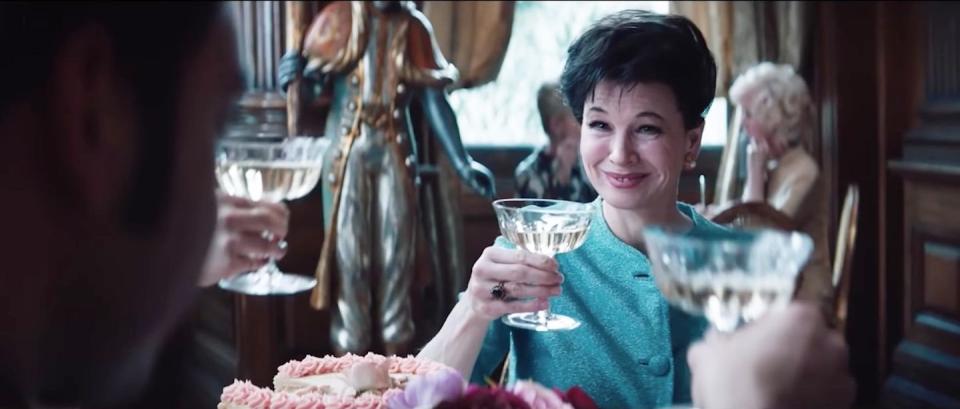
When she arrived in London, she was served with an injunction to stop her appearing in the show, issued by "solicitors acting for two American businessmen, and claims that a contract made in 1967 between an American company and Miss Garland provided for the exclusive use of her services until next June". (via the Observer.)
Despite the writ, Judy performed the entire Talk of the Town series. The show, as they say, must go on.
Judy is in US cinemas now and is released in UK cinemas on October 2.
Want up-to-the-minute entertainment news and features? Just hit 'Like' on our Digital Spy Facebook page and 'Follow' on our @digitalspy Instagram and Twitter account.
You Might Also Like
